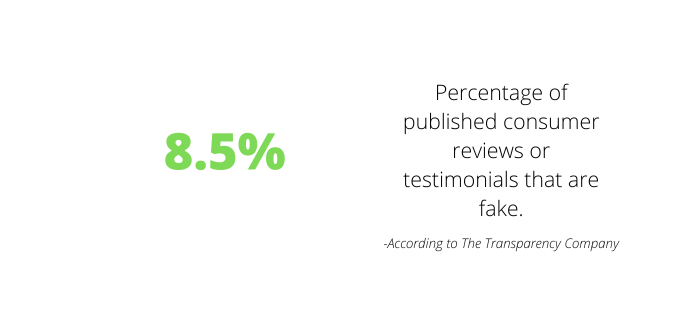The Federal Trade Commission is cracking down on fake product reviews.
The FTC has proposed a new rule to curb various practices that aim to deceive consumers with artificial positive reviews.
- The proposal bans adjacent practices such as review suppression and misleading consumers into thinking a legitimate positive review applies to a separate product.
How Big Is The Problem?
Approximately 8.5% of published reviews “for all industries” are fake, according to one of the solicited comments in the notice of proposed rulemaking, from The Transparency Company, an entity dedicated to fighting fake reviews.
The full extent of the problem is nearly impossible to calculate, as the sophistication used to create these fabrications is arguably outpacing our means to detect them.
- For a number of years, scientists have worried that artificial intelligence could greatly exasperate the problem of fake reviews, and a there’s been a recent explosion in available AI technology in 2023.
“As AI matures it is not a stretch to suppose it will be used to corrupt online review systems that so many people turn to before opening their wallets,” Scientific American wrote in 2017.
Such deception amounts to what is essentially theft from consumers and puts honest businesses at a disadvantage while blunting the effectiveness of legitimate testimonials as promotion.

The FTC’s Proposal
There are a number of ways that bad actors can use the product review process to conceive consumers. The FTC’s proposal looks to ban the following practices:
- Buying or selling fake consumer reviews
- Review Hijacking – The process of repurposing a consumer review for one product so that it appears to be a review for a separate product.
- Company employees writing product reviews without disclosing their relationship to the product’s parent company.
- Suppression of negative reviews.
“Our proposed rule on fake reviews shows that we’re using all available means to attack deceptive advertising in the digital age,” says Samuel Levine, director of the FTC’s Bureau of Consumer Protection. “The rule would trigger civil penalties for violators and should help level the playing field for honest companies.”
- A recent precedent by the Supreme Court has made it difficult for the FTC to successfully seek monetary relief for consumers under the FTC Act.
The notion to propose rulemaking was approved 3-0 in the Commission vote.
The Promo Perspective
The FTC turning its attention toward fake reviews is good for the promo industry. Promotional products are a successful promotional tool, and some form of client testimonial has been a primary reason the industry has grown and thrived for generations.
Cutting out fake reviews is good for the industries and companies that can boast legitimate positive reviews.
However, 8.5% is a huge percentage of reviews to be fake, and the number likely does not get that high only due to deliberately bad actors. Bad technological practices spread quickly – especially if they can be framed as common practice.
- As the FTC begins the process of attempting to enforce these bans, it is an opportunity sure to check with your IT department or web design team to ensure that your company is not unwittingly employing tactics like review hijacking or internal employees posting reviews disguised as impartial.


